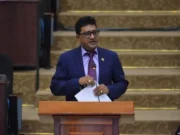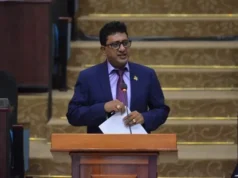Guyanese health authorities are still awaiting information from the World Health Organisation (WHO) about the new COVID-19 variant, Omicron, before making critical alterations to the country’s plan to combat the virus responsible for the deaths of close to 990 citizens since March 2020.
Already, Jamaica and Trinidad and Tobago have implemented travel restrictions, barring flights from several countries where the variant is believed to exist. Guyana has not made any changes to its travel list.
According to the country’s President, Dr Irfaan Ali, vaccination seems to be the only “tool” to curb transmission, hospitalization and death. The Head of State is therefore urging citizens to get vaccinated, and for those who qualify for boosters, to get inoculated immediately.
“We’re still awaiting further details from WHO (World Health Organisation), but what I can say to you: our only tool to be ahead of all these variants; our only tool to be ahead of all the changes and mutations that we’re seeing is vaccination. If it is that this variant is far more infectious, then the only thing that can protect us is vaccination. The only thing that can slow hospitalization is vaccination. The only thing that can slow [the] death rate very successfully is the vaccination,” he said in an address to the nation early Monday afternoon.
Some 276,888 Guyanese adults have been vaccinated to date. According to the Health Minister, Dr Frank Anthony, this number represents 54% of the adult population, with 399,829 (77.9%) receiving both doses of a vaccine since the campaign rollout earlier this year.
So far, 29,088 Guyanese between the ages of 12 and 17 have received the first dose of a COVID-19 vaccine, with 20,270 taking both jabs. These are equivalent to 39.9% and 27.8% respectively, of the adolescent population.
On 26 November 2021, WHO designated the variant B.1.1.529 (Omicron) a variant of concern, on the advice of the organisation’s Technical Advisory Group on Virus Evolution (TAG-VE). According to the WHO, this decision was based on the evidence presented to the TAG-VE that Omicron has several mutations that may have an impact on how it behaves, specifically, its transmissibility and severity.
The number of people testing positive has risen in areas of South Africa affected by this variant. Information emanating from the WHO is that a large number of researchers around the world are working to better understand Omicron. Studies include assessments of transmissibility, severity of infection (including symptoms), performance of vaccines and diagnostic tests, and effectiveness of treatments.













